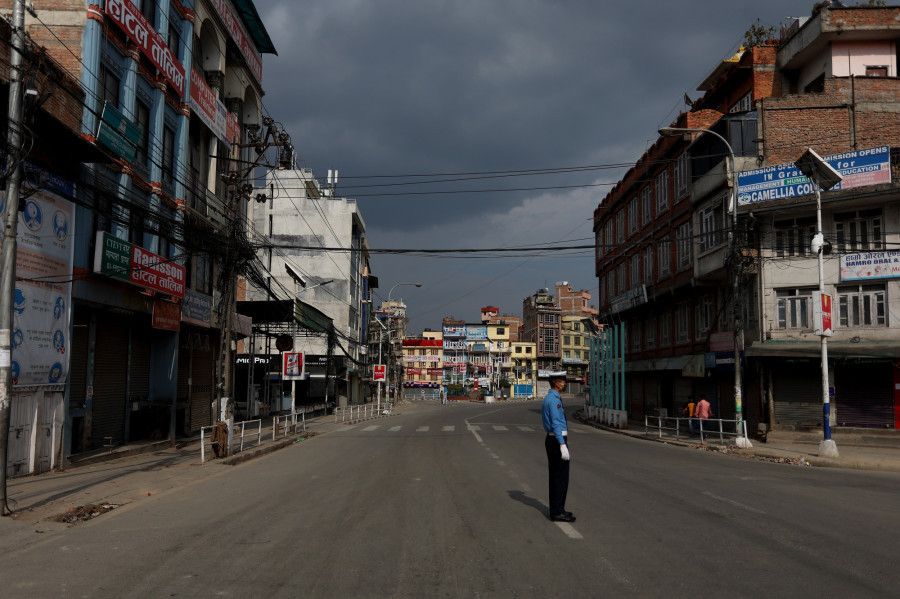National
Experts call for utilising restriction period to step up measures to fight the virus
Stern restrictive measures declared for Valley for seven days with a ban on public mobility and vehicular movement.
Tika R Pradhan
Starting Wednesday midnight, chief district officers of Kathmandu, Lalitpur and Bhaktapur have put a ban on public mobility, unless for buying medicines and other essentials, and vehicular movements in the Valley.
These are among the restrictions on various other activities and services imposed by a meeting of the joint security committee of Kathmandu Valley in the wake of the rising numbers of coronavirus cases.
“Prohibitory orders have been issued for the Valley as part of a measure to contain the spread of the virus,” said Humkala Pande, chief district officer of Bhaktapur.
The orders will remain in force for seven days until August 26 midnight.
“But the security committee could extend the duration of the prohibitory orders after assessing the situation,” Pande told the Post.
The Valley has seen a sudden spike of Covid-19 cases over the last few days, especially after the four-month-long lockdown was lifted on July 21.
On Tuesday, the Health Ministry said that 205 persons were infected within the Valley in the last 24 hours–138 in Kathmandu, 50 in Lalitpur and 17 in Bhaktapur. This is the highest number of positive cases in the Valley in a single day.
The country’s Covid-19 tally on Tuesday rose to 28,257, with 1,016 new cases. the highest for a single day.
With seven new deaths announced on Tuesday, Covid-19 fatalities have reached 114.
According to a notice published by the authorities, people will not be allowed to go out of their homes except to buy medicines, foodstuff and other essential goods and services. All businesses except those selling essential goods and services will have to remain shut, and all private and public vehicles will have to stay off the roads.
Those transporting essential goods like medicines, foodstuff, fuel, cooking gas, vegetables, fruits and milk will be allowed to ply.
Similarly, those providing essential services like electricity, telecommunications, information and communications, garbage collection, customs, quarantine, isolation, health and funeral are allowed. All academic institutions including tuition centres and language institutes must remain closed.
Earlier, starting August 14 midnight, the local administration offices had imposed restrictions on various activities and services in the Valley. Restaurants were limited to takeaways and deliveries, while all festival gatherings and public functions in open spaces had been banned.
Public health experts have long argued that more restrictive measures, together with increased testing and tracing, are required if the chain of virus transmission is to be broken.
The new restrictive measures were announced by the chief district officers of the Valley as per the decision taken by the Cabinet on Monday.
While announcing the Cabinet decisions, Finance Minister Yubaraj Khatiwada, also the government spokesperson, said the chief district officers can invoke provisions of the Infectious Disease Act 1964 and Local Administration Act (2028).
As per the Local Administration Act, those violating the orders can be fined up to Rs 500 or sentenced to one month in jail or both directly by chief district officers. The Infectious disease Act has similar provisions except that the fine is Rs 100.
Currently, authorities are slapping people with a fine of Rs100 for not wearing masks in public places.
After two positive cases were detected in the country, the government on March 24 had imposed a nationwide lockdown. The lockdown continued till July 21. But, by then, the virus cases had crossed the 17,000 mark.
Public health experts had criticised the government for failing to utilise the lockdown period to step up measures like setting up quarantine and isolation facilities, increasing hospital beds, providing training for health workers and expanding tests.
“These fresh restrictive measures will fail to serve the purpose if the authorities have not learned a lesson from the past lockdown,” said Dr Sher Bahadur Pun, chief of the Clinical Research Unit at Sukraraj Tropical and Infectious Disease Hospital. “We should take necessary measures to break the chain of transmission.”
Since the sudden rise in the number of virus cases, the authorities are struggling to conduct contact tracing in an effective manner, while health facilities are already overwhelmed, as they lack isolation beds.
“We need to step up and make preparations if we want to save lives,” said Pun, who is a virologist.
There is a shortage of isolation beds in Kathmandu and across the country, with 2,887 persons infected with the virus living in home isolation. As many 6,752 people are in institutional quarantine, according to the Health Ministry data published on Tuesday.
Kathmandu has more than 500 active cases and is among five such districts in the country—the others being Morang, Mohattari, Parsa and Rautahat.
According to Health Ministry data, of the 118 persons in intensive care in the country, 52 are in Bagmati Province and all eight who are on ventilator support in the country are in Bagmati.
According to Pun, testing, tracing and isolation are only options that can help curb the spread of the virus.
“We should increase isolation beds and make contact tracing more effective. We need to have more human resource and buy necessary equipment to save lives,” said Pun. “Awareness among people is also key. If we cannot do these things, restrictive measures alone won’t help.”
Arjun Poudel and Binod Ghimire contributed reporting.




 20.12°C Kathmandu
20.12°C Kathmandu














